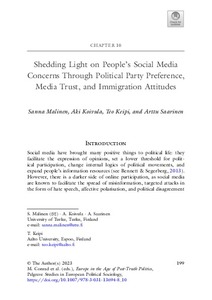Shedding Light on People's Social Media Concerns through Political Party Preference, Media Trust, and Immigration Attitudes
Malinen Sanna; Koivula Aki; Keipi Teo; Saarinen Arttu
https://urn.fi/URN:NBN:fi-fe2022121371211
Kuvaus
Tiivistelmä
The emergence of fake news has systematically challenged traditional media institutions as disinformation and misinformation are increasingly utilised in political attacks on social media. As in many countries, also in Finland, the emergence of current counter media sites is closely connected to the rise of the anti-immigration movement, and immigration policies and immigrants have been targets of the massive social media disinformation and misinformation campaigns. By employing a nationally representative survey (N = 3724) from Finland, this study investigates how three social-media-related concerns addressing misinformation and disinformation are explained by political party preferences, media trust, and immigration attitudes. We found that the supporters of the populist party, the Finns, had more critical views on freedom of expression and monitoring of hateful content on social media. Moreover, they were less concerned with the flow of fake news on social media. Based on mediation analysis, we found that trust in traditional media and attitudes on immigration are lowest among the supporters of the Finns, which also explained their different views on fake news, freedom of expression and hateful content monitoring. Even though the independent variables were highly inter-correlated, they also associated individually with social media users’ perceptions. We argue that the accumulation of negative immigration attitudes and low trust in the media is reflecting attitudes towards social media among the supporters of populist parties. The results underline the populist right-wing communication strategy, which questions the reliability of mainstream media, undermines professional journalism, criticises political correctness, and appeals to those who are most frustrated with mainstream media and critical towards immigration.
Kokoelmat
- Rinnakkaistallenteet [27094]
